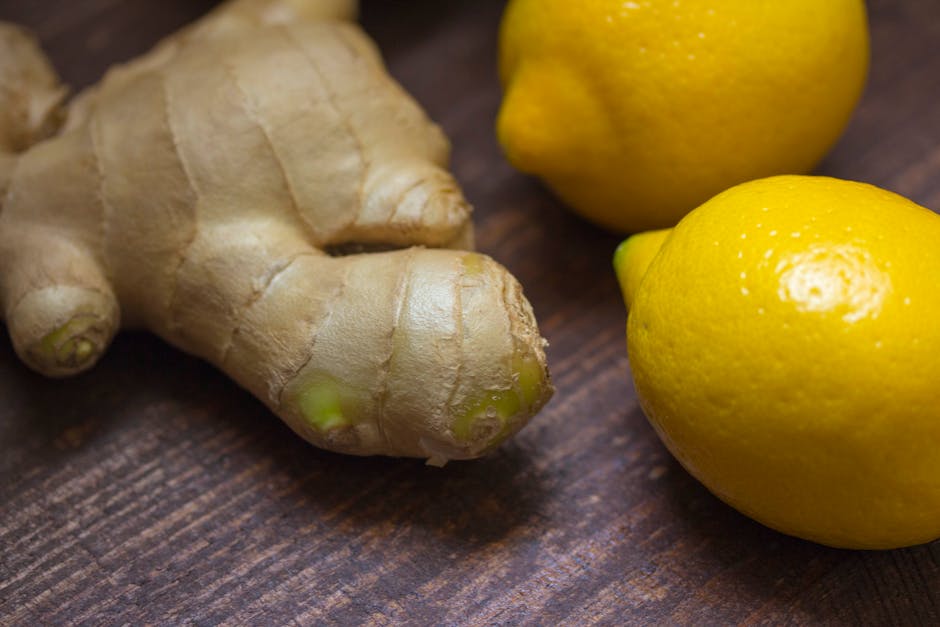Benefits of ginger in managing pain
When it comes to managing pain, whether chronic or acute, the search for effective remedies often leads us down various paths. From over-the-counter medications to alternative therapies, the quest for relief can be a challenging journey. However, one natural ingredient that has been gaining attention for its potential benefits in pain management is ginger. This humble root, commonly found in kitchens around the world, holds a treasure trove of therapeutic properties that extend beyond its culinary uses. In this article, we will delve into the fascinating world of ginger and explore its remarkable benefits in managing pain.
The Origins of Ginger

Ginger, scientifically known as Zingiber officinale, has been used for centuries in various cultures for its medicinal properties. Originating in Southeast Asia, ginger has a long history of being utilized in traditional medicine systems such as Ayurveda and Traditional Chinese Medicine (TCM). Its distinctive flavor and aroma have made it a popular addition to culinary dishes, but it is its healing properties that truly set ginger apart.
The Key Components of Ginger

What makes ginger such a potent remedy for pain? The answer lies in its rich composition of bioactive compounds. Ginger contains a group of phenolic compounds called gingerols, which are responsible for its spicy taste and anti-inflammatory properties. Additionally, ginger also contains other bioactive molecules such as shogaols, paradols, and zingerone, each contributing to its therapeutic effects.
Studies have shown that these bioactive compounds in ginger have powerful antioxidant and anti-inflammatory properties, making it a valuable asset in managing various types of pain, including arthritis, menstrual cramps, migraines, and muscle soreness.
Ginger’s Role in Arthritis Pain Management

Arthritis, a common condition characterized by joint inflammation, can cause debilitating pain and stiffness. Traditional treatments for arthritis often involve nonsteroidal anti-inflammatory drugs (NSAIDs) or corticosteroids, which can have side effects with prolonged use. This is where ginger can offer a natural alternative.
Research has shown that ginger can help reduce the symptoms of osteoarthritis and rheumatoid arthritis by decreasing inflammation and pain. A study published in the Journal of Medicinal Food found that ginger extract could inhibit the production of inflammatory molecules in the joints, providing relief for arthritis patients. Additionally, ginger’s antioxidant properties help protect the joints from damage caused by free radicals, further enhancing its efficacy in arthritis pain management.
Ginger’s Impact on Menstrual Cramps

For many women, menstrual cramps are a monthly ordeal that can significantly impact their quality of life. The throbbing pain and discomfort associated with menstrual cramps can be challenging to manage, leading to reliance on painkillers. However, ginger offers a natural remedy that can help alleviate menstrual cramps without the side effects of medication.
A study published in the Journal of Alternative and Complementary Medicine demonstrated that ginger was as effective as mefenamic acid, a common pain-relieving medication, in reducing the severity of menstrual cramps. The anti-inflammatory properties of ginger help relax the uterine muscles, easing the pain and discomfort experienced during menstruation. Additionally, ginger’s ability to improve blood circulation can further aid in relieving menstrual cramps by promoting better oxygen flow to the pelvic region.
Ginger’s Role in Migraine Management
Migraines are a type of headache characterized by intense throbbing pain, often accompanied by nausea, sensitivity to light, and sound. Managing migraines can be challenging, as conventional treatments may not always provide sufficient relief. However, ginger has emerged as a promising natural remedy for migraine management.
Studies have shown that ginger’s anti-inflammatory and analgesic properties can help reduce the severity and duration of migraines. A randomized, double-blind study published in the Phytotherapy Research journal found that ginger powder was as effective as sumatriptan, a common migraine medication, in relieving migraine symptoms. The researchers attributed ginger’s efficacy to its ability to block prostaglandins, compounds that play a role in inflammation and pain perception.
Ginger’s Impact on Muscle Soreness
Whether due to intense exercise or physical exertion, muscle soreness can be a common occurrence that hinders daily activities. While rest and hydration are essential for muscle recovery, ginger can also play a valuable role in alleviating muscle soreness and speeding up the healing process.
A meta-analysis published in the Journal of Pain analyzed the effects of ginger supplementation on muscle pain and recovery. The researchers found that ginger supplementation reduced muscle pain by 25% and accelerated recovery by 23%, compared to a placebo. The anti-inflammatory properties of ginger help decrease the production of inflammatory cytokines in the muscles, leading to quicker healing and relief from soreness.
Common Misconceptions About Ginger
Despite its numerous benefits, ginger is not a cure-all for pain management. It is essential to understand that ginger’s efficacy varies from person to person, and its effects may not be instantaneous. Additionally, while ginger is generally safe for most people, individuals with certain medical conditions such as gallstones or bleeding disorders should consult a healthcare provider before using ginger as a remedy.
Another common misconception is that consuming ginger in large quantities will amplify its pain-relieving effects. In reality, moderation is key when using ginger as a supplement or remedy. Excessive consumption of ginger can lead to digestive issues such as heartburn or diarrhea, so it is important to follow recommended dosages and listen to your body’s response.
FAQs About Ginger in Pain Management
1. Can ginger interact with medications?
Ginger is generally considered safe when consumed in moderate amounts. However, it may interact with certain medications, such as blood thinners or anticoagulants. If you are taking medication, consult with your healthcare provider before incorporating ginger into your regimen.
2. How should ginger be consumed for pain relief?
Ginger can be consumed in various forms, including fresh ginger root, ginger tea, ginger supplements, or ginger essential oil. The most effective form of ginger for pain relief may vary depending on the type of pain being addressed. Experiment with different forms of ginger to find what works best for you.
3. Are there any side effects of using ginger for pain management?
While ginger is generally well-tolerated, some individuals may experience mild side effects such as heartburn, diarrhea, or allergic reactions. If you experience any adverse effects, discontinue the use of ginger and consult a healthcare professional.
To Wrap Things Up
In conclusion, the benefits of ginger in managing pain are vast and well-supported by scientific research. From arthritis to menstrual cramps, migraines, and muscle soreness, ginger offers a natural and effective solution for various types of pain. By harnessing the anti-inflammatory, antioxidant, and analgesic properties of ginger, individuals can find relief from pain without relying on conventional medications.
As with any natural remedy, it is essential to consult with a healthcare provider before using ginger for pain management, especially if you have underlying health conditions or are taking medications. By incorporating ginger into your wellness routine mindfully and responsibly, you can tap into the therapeutic potential of this versatile root and experience the transformative benefits it has to offer.




